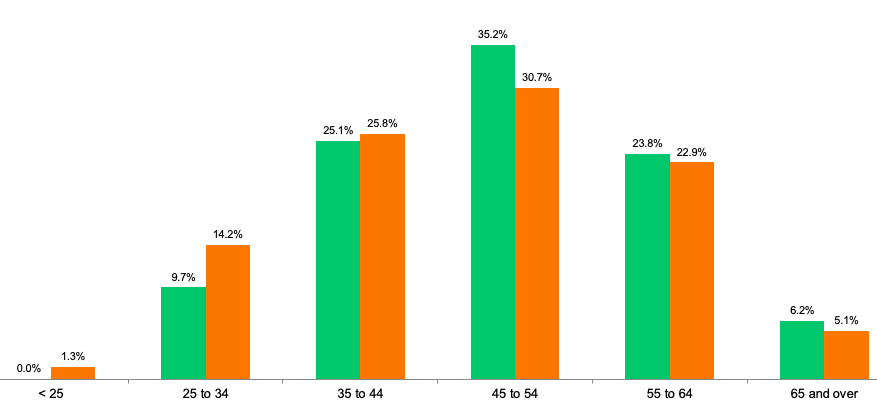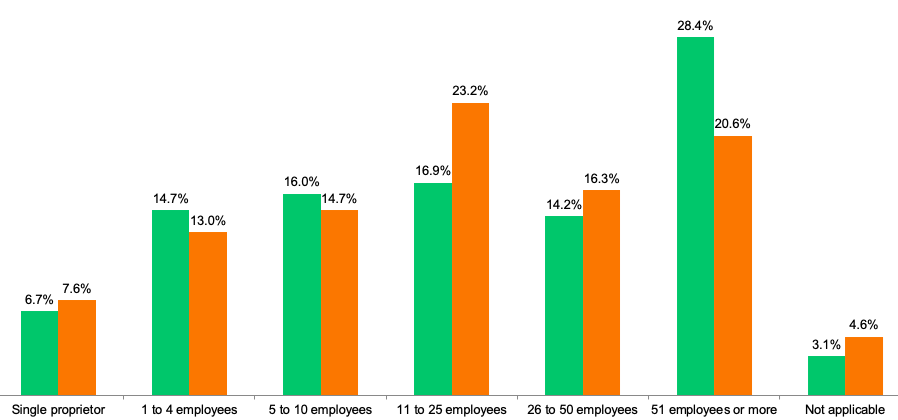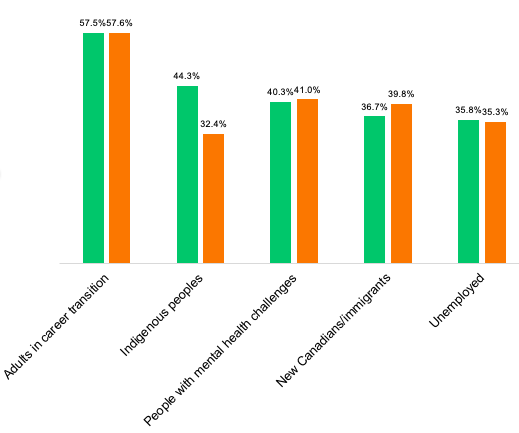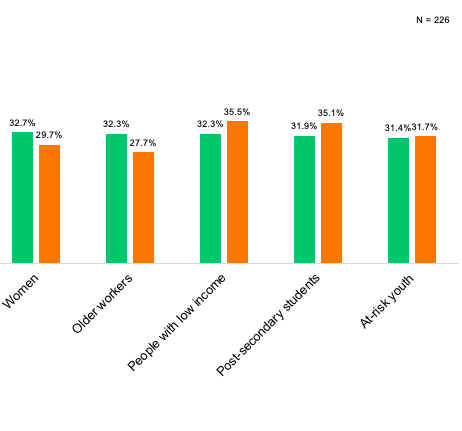It is interesting to see how the profession of career development differs in BC compared to the rest of Canada, based on the results of CERIC’s 2019 Survey of Career Service Professionals. BC was in line with the national average except in a few areas related to our career development professionals’ (CDPs) age, the size of our organizations, how we are educated and where we would like to focus our professional development. We also see a considerable difference in our clients’ concerns compared to the national average.
Demographic distribution
In BC, we are an older group of CDPs. We have almost 5% more people between the ages of 45-54 and nearly 5% fewer people between the ages of 25-34 working in career development. This variation is in line with what we noticed in 2017 in ASPECT’s work with the BC Centre for Employment Excellence. As a part of a Biz Hub research and innovation project, our working group identified that BC was having difficulty recruiting and retaining people in career development. We determined that more information was needed to help prospective career professionals enter and navigate the profession. Our hub created a CDP career path infographic to explain what a career professional does and relevant labour market information.

In BC, there remains a challenge for employers to find staff with CDP training and certification, especially in smaller, rural, and remote communities. Thankfully, many professional development opportunities are now available virtually, providing increased access to the training needed. Also, the update of the standards and guidelines for CDP and the promise of a national credentialling body, the value proposition for those considering a career in the sector will become more compelling.
This article is part of a series exploring the regional results of CERIC’s 2019 Survey of Career Service Professionals amid our new reality. Read more:
Impact of Work BC changes
The size of BC’s organizations is significantly larger than the national average. The CERIC survey results show that over 28% of BC career services organizations have 51 employees or more, compared to 20.6% nationally; the number of BC career organizations with 11-25 employees is 6% higher than the national figure. This variance is not difficult to explain as we saw the further professionalization of employment services during the WorkBC contract procurement process. The financial guarantees required to participate in the process made it necessary for organizations to take a financial risk – something smaller organizations, especially those with volunteer boards of directors, were not able to do. Those without a rock-solid financial structure and the capacity needed were unsuccessful in the process.
Size of careers services organization (including departments and satellites)
The trend toward larger social service organizations is a concern for small community-based organizations, especially in a virtual world where services can be delivered from anywhere. Community-based information is crucial to inform policy and program development.
The WorkBC contracts comes with a requirement that no social service organization may use their organization name in advertising their employment services and everything is branded under the “WorkBC” moniker. The advantage is that there is a consistent model for anyone in the province to access services, yet the disadvantage is that the good (or bad) reputation of a service provider is hidden by the provincial branding. Unless there is a concerted effort by the provincial government to change the way in which they procure and negotiate WorkBC contracts, it is unlikely this situation will change. Thankfully, contracts funded through the Workforce Development Agreement and others not attached to Employment Insurance, have allowed smaller service providers to survive and to meet the needs of those most vulnerable with community-based expertise.
Education and PD
BC respondents to the CERIC survey were 9% more likely than the rest of Canada to have a college certificate and 10% less likely to have a master’s degree. Finding funds within career development organizations to support their employees’ professional development is sadly lower than it should be. The Social Services Sector Roundtable (SSSR), organized by BC’s Minister of Social Development and Poverty Reduction, has identified funding for sector training as a high priority and recently announced a $10 million fund to help build expertise and capacity within the sector. ASPECT BC is pleased to sit on the advisory committee for the SSSR.
When asked where they would like to focus their professional development, BC CDPs were almost 12% more likely to select working with Indigenous peoples. This is not surprising, as there are 54 Indigenous organizations providing employment, job search and placement services, and 102 WorkBC centres throughout the province providing employment services and support to Indigenous populations. Investments by the provincial government and a greater awareness of inequities raised by the Black Lives Matter movement have resulted in many of us challenging our colonial world view and yearning to expand our understanding. We are also interested collectively in professional development related to working with adults in career transition (almost 5% higher than the national). At the time of the CERIC survey, the unemployment rate in BC was 5% and CDPs were focused on providing services to underrepresented groups in the labour market.
Client group(s) respondents would prefer to focus their professional development on (Top 10 responses)
Client concerns
Finally, the survey results turn to what CDPs are hearing from their clients, and in this area, we see a significant difference from the rest of the country. Career professionals in BC were almost 10% more likely to report their clients were stressed about their ability to find decent-paying work, while they were 10% less likely to report client anxieties about making the right career decision. For anyone familiar with the BC housing market, this is not a surprise. Even in rural and remote communities, we see a competition for available and affordable housing that resembles what we see in urban markets. Finding affordable and safe daycare has been another challenge, which has been exacerbated by COVID-19. The provincial government has made daycare and housing a funding priority in the past two provincial budgets, which we hope will remove these hurdles as significant barriers to employment in BC.
Canadians that you advise are mostly stressed about
It is interesting to see how very similar the experience of BC career professionals is to their colleagues across Canada. BC respondents represented 16.8% of the total completed surveys, a total of 227 respondents. Although BC’s responses stood out in a national context in the areas of CDP age, organization size, education and professional development interest, none of the differences are surprising within a BC context. Even during the COVID-19 pandemic, there are opportunities to work through some of the barriers to employment and to support career development professionals in their own careers, contributing to our province’s and our country’s resiliency.








